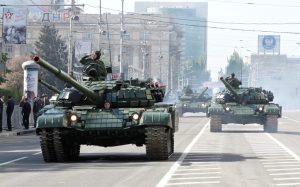Zoé Tkaczyk
Impunity Watch News Guest Writer
STRASBOURG, France – After Russia’s departure from the European Court of Human Rights (EUCHR), questions about how to handle cases pending before the Court and the alleged dilution of standards that initially allowed Russia to join the Court remain.
In 2002, the Court issued its first judgment against Russia to assist a Russian national conscripted to work on the Chernobyl nuclear plant disaster after brutal radiation exposure. But by 2012, 22,358 complaints had been filed against Russia. With a backlog of more than 120,000 cases, the Court was already facing a docket crisis, only exacerbated by Russia’s expulsion. In 2022, 2,129 judgments and decisions and 17,450 applications were pending against Russia.
The war in Ukraine only raised the count, and ECHR began publishing interim verdicts. Many view these procedural changes as undermining the Court’s ability to handle cases in its jurisdiction. That said, the interim ruling was the first international court to prove Russia’s occupation in Donbas since 2014 and considered the evidence from the occupied territories, including the downing of flight MH17 and actions by the Donetsk People’s Republic (DPR), Lugansk People’s Republic (LPR) and members of the Russian military.
But now, after the Russian exit, many question how the Court can handle the previously pending cases without jurisdiction, and these uncertainties are only exacerbated by Russia’s departure from the Council of Europe as well. Critics claim Russia was a thorn in both by weakening democratic standards in exchange for only mild internal reform in Russia.
These tensions have pervaded since Russia considered membership in 1994. And since 2014 and the annexation of Crimea, the relationship has been a sour one, with Russia refusing to pay dues. When Ukraine filed complaints against Russia’s acts, Russia did not listen to the ensuing Court orders. In 2022, after the full-scale invasion, the Kremlin did not listen to the Court order to stop hostilities. This situation deeply challenges the assumption that it is better to include rogue actors in international legal associations. Since Russia backed out, it is unclear if inclusion led to more harm or good, but it is clear that the Council and associated court were not successful in spreading liberal democracy to Russia as it had hoped.
Russia’s departure has not stopped the Council of Europe from acting on behalf of its victims in Ukraine and previously in Georgia. A key issue in these deliberations is identifying and defining conflict borders, which looks largely at where each state has control of its territory. Relying on past Georgian precedent, the ECHR did not have the jurisdiction to define borders because the “fog of war” prevented recognition of control during active hostilities. But earlier this year, the ECHR was able to rule that Russia controlled the DPR and LPR territories as of 2014 and assigned responsibility for the MH17 flight among other acts. Despite this ruling and revelation of the DPR and LPR alignment with Russia, the Kremlin continues to deny involvement. The ECHR ruling was certainly a political win for Ukraine, confirming the invasion began in 2014, not February 2022. It debunked Russian claims about independent separatist movements justifying the invasion. Russia’s objection to the ECHR’s subject matter jurisdiction over complaints concerning armed conflict was also rejected.
For now, the ECHR is considering issues of extraterritorial jurisdiction. The ECHR is considering any exceptional circumstances including jurisdiction ratione loci and jurisdiction ratione personae. The ECHR will consider occupation and annexation of another’s territory, whether unlawful or lawful and state agent’s authority over individuals in the territory. This is a win for Ukraine in that it legally declares when the war began, extending it to eight years earlier. The question that now remains is how to address violations that occurred after September 16, 2022, when Russia left the ECHR. It will remain responsible for acts carried out before that date, but no one is expecting compliance in the near future. If it seeks to return one day, a different question will emerge, but until then, the ECHR seems to be limited temporally by which violations it can examine.
This article is one of a seven-part series exploring the Russo-Ukrainian War. Zoé Tkaczyk is a J.D./MAIR candidate (May 2025) at the Syracuse University College of Law and Maxwell School of Citizenship and Public Affairs. This article series was inspired by sessions from the Carnegie-Maxwell Policy Planning Lab Fellowship: Postwar: Europe, Ukraine and the Future of European Order. Special thanks to Cora True-Frost and Alexa Connaughton for their guidance, feedback, and edits.
Atlantic Council – ECHR ruling confirms Russian invasion of Ukraine began in 2014 – 14 Feb. 2023
